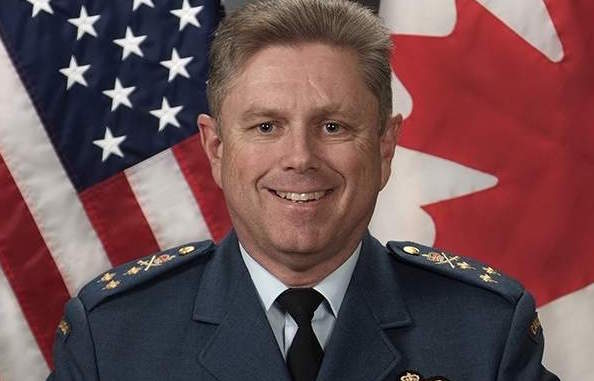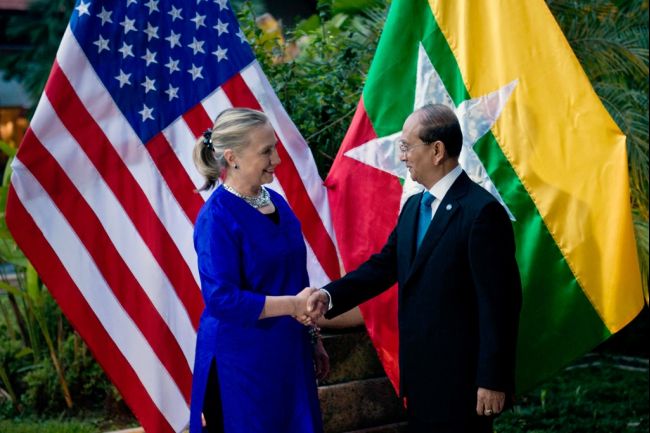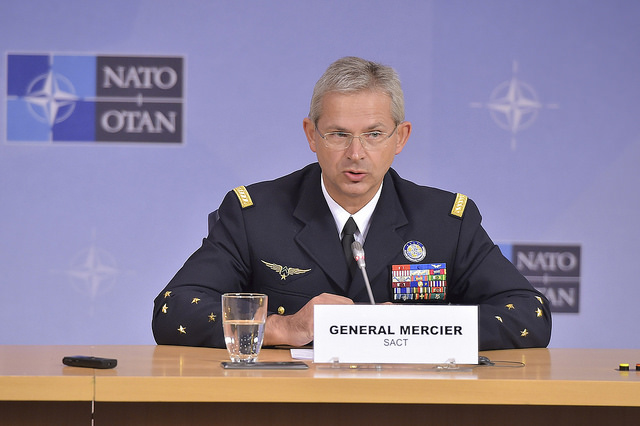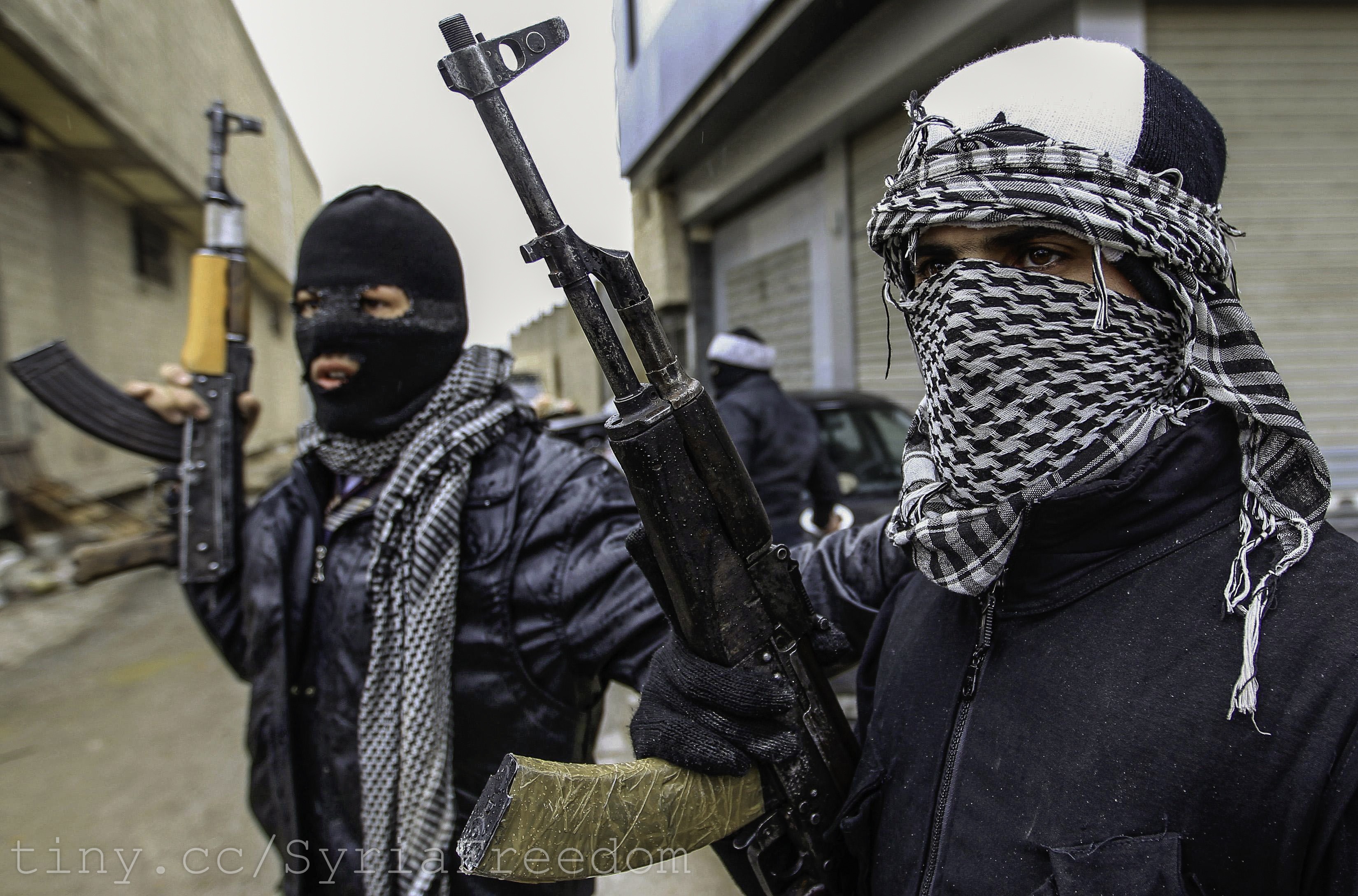On behalf of the NATO Association of Canada, I had the privilege to conduct an interview with Lieutenant-General Alain J. Parent. Lieutenant-General Alain J. Parent is the Deputy Commander, Allied Joint Force Command Naples in Naples, Italy. Taking a look back at his career, LtGen. Parent gives a close insight into the duties and responsibilities of his position, how he rose to the rank of a Deputy Commander, and discusses the importance of Canadian contribution through the involvement of NATO.
Background
Andi: Could you tell me about your educational background, and what interested you in the career path that led to becoming Deputy Commander?
LtGen. Parent: First of all I got to say Andi, you don’t join the Canadian Armed forces thinking that you will be a Deputy Commander somewhere. For me it came up as a dream, as a child I wanted to fly, so I wanted to become a pilot. I became a helicopter pilot, and after some years of flying, I decided to undertake leadership roles inside The Royal Canadian Air Force. It’s those leadership roles that led me from being Squad Commander to Commanding Wing and Air Division, and then being assigned at NORAD as a Deputy Commander. Now I am here at JFC Naples as a Deputy Commander. It’s a long and soon to be 37 year process.
As far as my education is concerned, I graduated High School in Montreal, and then went to College Militaire Royal in Saint-Jean-Sur-Richelieu, and I got a degree in Business Administration. After that I received various professional military education, one of which was getting my Masters in Strategic Studies at the Air War College in the United States, with the United States Air Force. When you are in the military, it is a lifelong learning experience, so there is a lot of education that comes with what we get to do.
Andi: What are your main duties and responsibilities now? How are they different from your previous position?
LtGen. Parent: When you are a Deputy Commander, your primary job is to support the commander, the general in charge. In the case here, and in the case of my previous job, the commander here at Naples is a US Four Star Admiral, and at NORAD it was a Four Star Admiral as well. My first job is to support the Commander, and often act on his behalf. On a day-to-day basis, basically my role is to keep informed of what is going on in our area of influence, area of responsibility, by getting various briefings. The staff produce various pieces of work, and a lot of the time at the end, the commander, at my decision and rule of commander of naval, provides direction and guidance to staff to achieve the objectives of the command. Here at Naples, in particular, I am responsible for the training of the Headquarters, so that we are able to take command of the NATO Response Force, which is an immediate reaction force for NATO in case of conflicts. I am also responsible for Force protection, and I oversee some of the financial aspects of leading the command. What I do now is very similar to what I did in my previous job at NORAD, except the area of responsibility was different. At NORAD, it was North American Aerospace Defense Command by National Command Canada-US, in here I elevated that experience where I got the privilege to get that experience more expanded right now, with 28 NATO partner countries that we work with for a collective defence in the Alliance.
Andi: What advice would you give to students who want to pursue this career path?
LtGen. Parent: I would say to any student, first thing is figure out what your dream is, and then pursue that dream with focus and energy. If it happens to be a military career, it is not easy. You cannot give up, and I would say you got to have perseverance, and a lot of study and education. Every student out there has their own objective in life; in the military we call that first principle of war: selection and maintenance of the aim. What I would tell the student now is select your aim, and then if it is your dream, pursue it with all your energy and efforts, and a lot of hard work and studying, and it will pay off.
Involvement in NATO
Andi: What is the Canadian contribution at the Naples base?
LtGen. Parent: At the Naples base there are 40 personnel officers, and non-commissioned members that are spread amongst various staff functions that we have here at the headquarters. I happen to hold the very key position by being the Deputy Commander, and then we have other personnel that satisfy the requirement. So NATO works on permanent establishment, and based on your contribution to NATO you get a certain post. And there are posts here at Naples, and as well as across Europe. Over all the NATO enterprise there are Canadians serving here in Europe, and also in Norfolk in United States.
Andi: Does Canada play a pivotal role within NATO? Specifically, what does Canada contribute to NATO that other countries may lack?
LtGen Parent: First of all the most important thing is the strength of the Alliance. Every Alliance member plays a pivotal role, because everyone has an equal voice. We work by complete consensus on everything we do. What Canada brings, as far as a pivotal role, if you want more of a concrete example, is Canadian by geography and by history, has certain ability and affinity and familiarity, for example first our neighbour to the south. So we understand and know the Americans will lead the organization in a lot of instances, and who is a great partner in NATO and provides a lot. We are good at providing a bit of translation in Europe of what Americans think. We also have a close affinity with the United Kingdom based on our history, and our participation in the commonwealth, and also the common language. We also have a close affinity with the French, based on the contribution that comes mainly from Quebec, from being a bilingual country. Also, a lot of the European countries recognize the sacrifices that Canada made in WWI and WWII, and the sacrifices made in Afghanistan. So, Canada is viewed as a strong valued partner, and we do our best to send our good people here to maintain a high level of credibility in all of our contribution.
Andi: Do you keep in contact with the Canadian Embassy in Italy? What do the majority of your correspondences entail? i.e regional security, European security, international?
LtGen. Parent: First and foremost, I am a NATO officer, and not a Canadian ambassador to the headquarters. However, I do have some contact with the Canadian Embassy, with the ambassador, and the defense attaché. The ambassador and the defense attaché come and visit us to gain information on what we see happening in the southern region of NATO. We do exchange viewpoints, but of a general nature. I do not establish a regular interaction with the Embassy, but I do have a relationships with all the ambassadors that decide to come visit us here at Naples. For example I hosted the ambassador of Hungary to Italy, and few other ambassadors. Some contacts, but its not specific, and is treated the same as I treat any other embassy that has an interest in what JFC Naples does, and what NATO does.
Andi: How does NATO’s growth impact the role of the Canadian Armed Forces?
LtGen. Parent: As you are probably aware, Canada right now is undergoing a defense policy review. There is wide consultation amongst the public, and I hope that you do your part in that, as well as the association that you are with. It would be premature of me to link the growth of Canadian Armed Forces with NATO right now. So right now, Canada participates to NATO within its means. We have a critical contribution, so besides the people in the Headquarters, HMCS Fredericton is now part of NATO’s maritime mission group 2, and they were one of the first ships to be part of the Agean Sea mission, for gathering information on the flow of migration with Turkey and Greece and the EU. We have a company that is on a six-month rotation in Poland that is conducting various exercises. We will make a proposal on where Canada can make further contribution to NATO. There are a lot of opportunities that will present themselves, but it is really up to the government, the minister, and the Chief of the Defence Staff, to answer your question.
Andi: How has NATO adapted its standard operating procedures in handling a humanitarian crisis that poses some degree of a threat, in which there is a possibility of ISIS infiltrating the masses?
LtGen. Parent: First of all at NATO we maintain a good relationship with the international organizations, and non-governmental organizations, and we prepare our plan in conjunction with them. You’ve got to understand that in the case of migration, and the case of the possibility of having ISIS infiltrators and all that, right now it not a NATO mission per say to do anything about that, except the Agean Sea mission where we have our group of ships providing good information to our allies of Turkey and Greece, and the Frontex, which is a border Agean Sea for the EU, so they get as much information so their coast guards, their military, their law enforcement authority can take the action. So far the mission has been greatly successful, and then for NATO to act in these terms we have to be asked for, and there has to be a consensus at the North Atlantic Council of the 28 Nations that we like to ask. So when we were asked by Turkey and Greece in February, within 48 hours we had ships in the Agean Sea, operating to help in this situation.
Andi: What do you want Canadians to know about Canada’s involvement in NATO?
LtGen. Parent: Canada is a strong and reliable partner. All Canadians assigned to NATO have the capability and the ability, and they do make flying our Canadian flag proud. We can understand that NATO is a defensive alliance, that works for peace and security, and everything we do is defensive in nature. Canada is a founding member of NATO, Canada has spilled its treasure of blood in Europe, and its in the best Canadian interests to keep peace in Europe, and that Canada is a strong and reliable partner. When we work together we are much stronger, than when every nation tries to do things individually. It’s a great honour for me to be part of this great alliance, there is no other alliance like this in the world, and I really want Canadians to be proud of their serving members that are from the Army, Navy, Air Force, and civilian personnel that serve with the NATO flag.
Once again, I would like to thank Lieutenant-General Alain J. Parent for taking the time to interview with the NATO Association of Canada, and for the insightful wisdom and advice he has offered our readers.




